Introduction
Customer service is evolving rapidly, driven by rising consumer expectations for instant, personalized, and seamless support. Artificial Intelligence is becoming central to this shift, enabling faster responses, smarter interactions, and greater scalability. From automating routine inquiries to delivering real-time insights, AI is redefining how companies connect with their customers.
What is AI and Why Does It Matter in Customer Service?
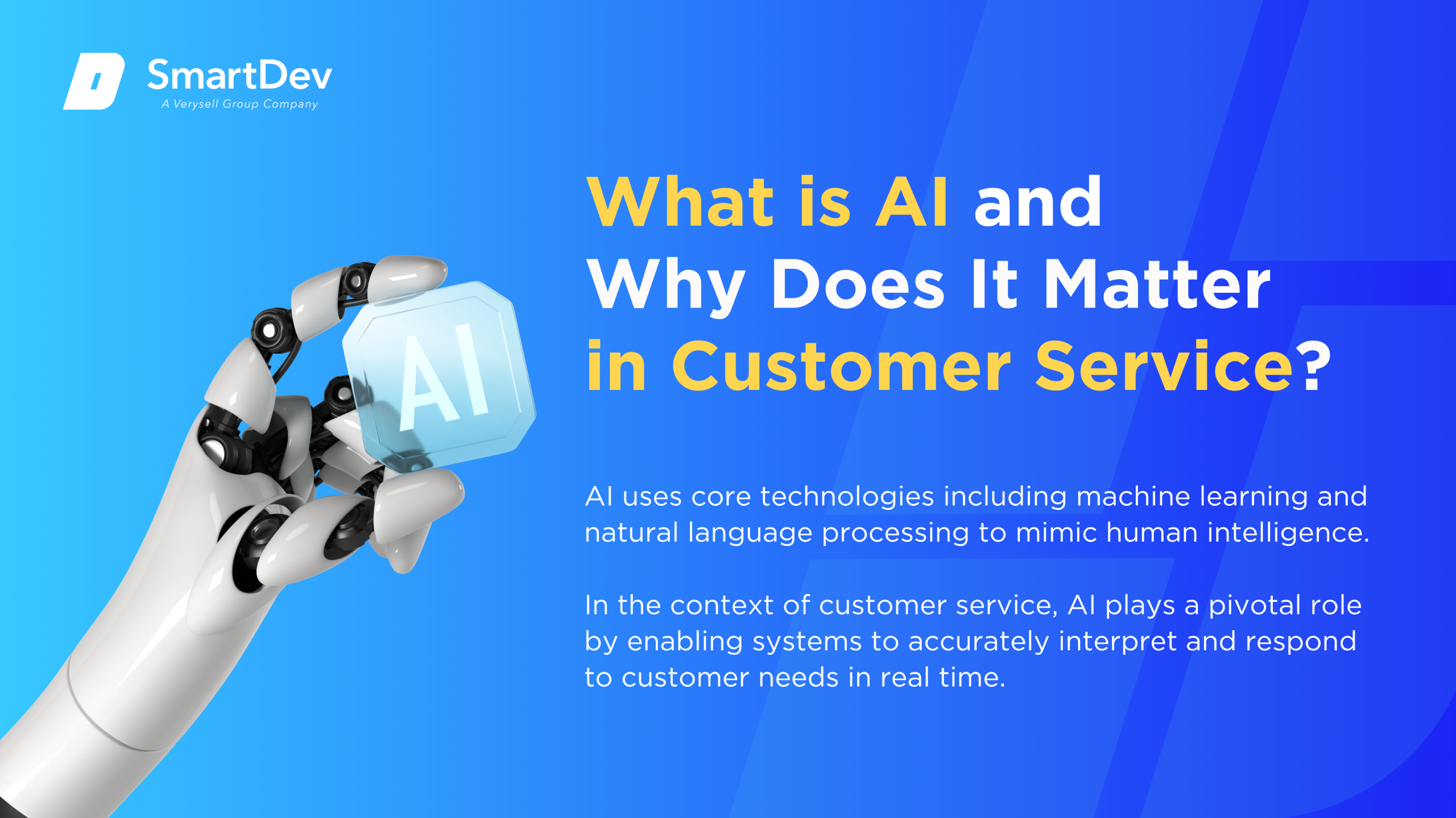
Definition of AI and Its Core Technologies
Artificial Intelligence (AI) encompasses computer systems designed to perform tasks that typically require human intelligence, such as learning, reasoning, problem-solving, and decision-making. Core technologies include machine learning, natural language processing (NLP), and computer vision. These enable machines to process vast amounts of data, recognize patterns, and make informed decisions.
In the context of customer service, AI plays a pivotal role by enabling systems to accurately interpret and respond to customer needs in real time. These capabilities empower businesses to handle large volumes of interactions with consistency and precision. The outcome is a marked improvement in service efficiency, responsiveness, and customer satisfaction.
The Growing Role of AI in Transforming Customer Service
AI is playing an increasingly strategic role in customer service by automating routine tasks, enabling 24/7 support, and providing real-time insights into customer interactions. This transformation allows businesses to scale efficiently without compromising responsiveness or quality.
For customer service teams, AI acts as a force multiplier—surfacing relevant information, recommending next steps, and reducing manual effort during live engagements. This enables agents to focus on high-value interactions that require critical thinking and emotional intelligence.
Companies are also using AI to analyze customer feedback from various channels, such as social media and surveys, to gain insights into customer satisfaction and identify areas for improvement. This proactive approach helps in refining products and services to better meet customer expectations.
Key Statistics and Trends Highlighting AI Adoption in Customer Service
The adoption of AI in customer service is accelerating, driven by its ability to enhance efficiency, personalize experiences, and support at scale. AI is increasingly central to customer service operations. A McKinsey survey indicates that 78% of organizations have adopted AI in at least one business function, with service operations being a primary area of implementation.
According to Zendesk, 83% of employees cite AI’s decision-making capabilities as a key benefit, and 80% report improvements in their quality of work. Furthermore, 70% of customer experience leaders believe generative AI enhances the efficiency of digital customer interactions.
By 2025, AI is expected to handle up to 95% of all customer interactions, both voice and text, reflecting a major shift toward automated support models. In parallel, 67% of consumers globally have engaged with chatbots in the past year, signaling growing comfort and trust in AI-driven service experiences.
Business Benefits of AI in Customer Service
AI is creating measurable value in customer service by transforming how teams operate and interact with customers. As adoption grows, the technology is proving essential not just for efficiency, but for enhancing the overall service experience. Below are the most significant business benefits driving this shift.
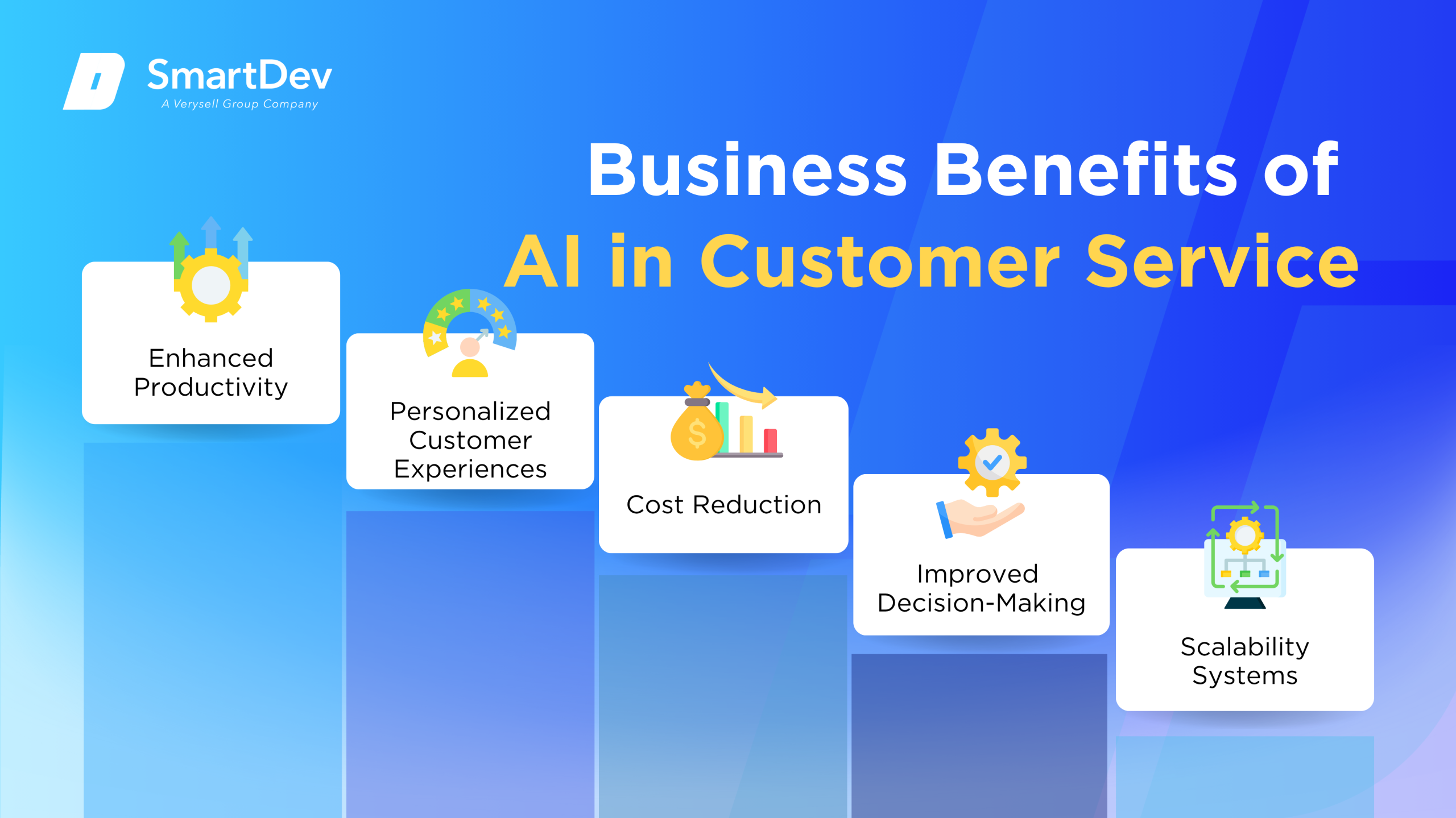
1. Productivité accrue
Automating routine and time-consuming tasks such as ticket classification, data entry, and routing inquiries significantly streamlines operations. This reduction in manual workload improves response times and minimizes errors in the early stages of customer interactions. As a result, support teams can dedicate more time to complex and strategic customer needs.
With tools like AI-powered chatbots and virtual assistants, companies can engage with multiple customers simultaneously without degrading service quality. This not only increases the overall capacity of service teams but also ensures that customers receive timely and accurate support. The shift to automation creates a more agile and scalable support function.
To explore how AI boosts efficiency beyond customer service, our detailed guide on AI use cases in operations will show you real-world impact and strategies.
2. Personalized Customer Experiences
Customer service platforms equipped with AI can analyze behavioral data, purchase history, and prior interactions to deliver highly personalized experiences. Tailored responses and product recommendations help build stronger relationships and improve overall satisfaction. This level of customization increases customer trust and encourages long-term loyalty.
Predictive algorithms also make it possible to address needs before they arise. Insights drawn from historical data enable proactive outreach, such as timely reminders or contextual offers. Moving from reactive to proactive service deepens engagement and demonstrates a commitment to customer success.
To see how AI can tailor interactions at scale, our guide on personalizing customer experience through virtual assistants explores strategies for creating deeper, data-driven engagement.
3. Cost Reduction
Automated systems drastically reduce the need for large support teams to manage routine inquiries. With 24/7 availability and the ability to resolve high volumes of issues, these systems bring substantial labor cost savings. Businesses can maintain high service levels without scaling headcount at the same pace.
In addition to handling tasks, AI can identify inefficiencies in current workflows and suggest optimizations. These improvements result in leaner operations and better use of resources. Over time, the cumulative savings can be reinvested into strategic initiatives across the organization.
4. Improved Decision-Making
Access to real-time analytics and customer insights enables managers to make faster, more informed decisions. Clear visibility into behavioral patterns, service performance, and issue trends supports continuous refinement of operations. These insights are essential for aligning customer service with broader business objectives.
AI-driven tools like sentiment analysis also help detect customer emotions and intent during interactions. These insights guide prioritization of service efforts and inform product or messaging adjustments. The ability to act on meaningful signals elevates the customer experience.
5. Scalability
As customer demand fluctuates, scalable systems are essential for maintaining consistent service. AI enables customer service operations to expand quickly and cost-effectively, particularly during peak periods. This flexibility ensures that customer support keeps pace with business growth.
Multilingual capabilities further enhance scalability by allowing companies to serve global audiences without expanding local teams. Centralized AI-driven systems maintain quality across regions, delivering a uniform experience to customers worldwide. The result is a support model that adapts effortlessly to evolving needs.
Challenges Facing AI Adoption in Customer Service
While AI brings significant advantages to customer service, its adoption is not without obstacles. From technical complexity to human-centered concerns, these challenges require a strategic and balanced approach to ensure long-term success.
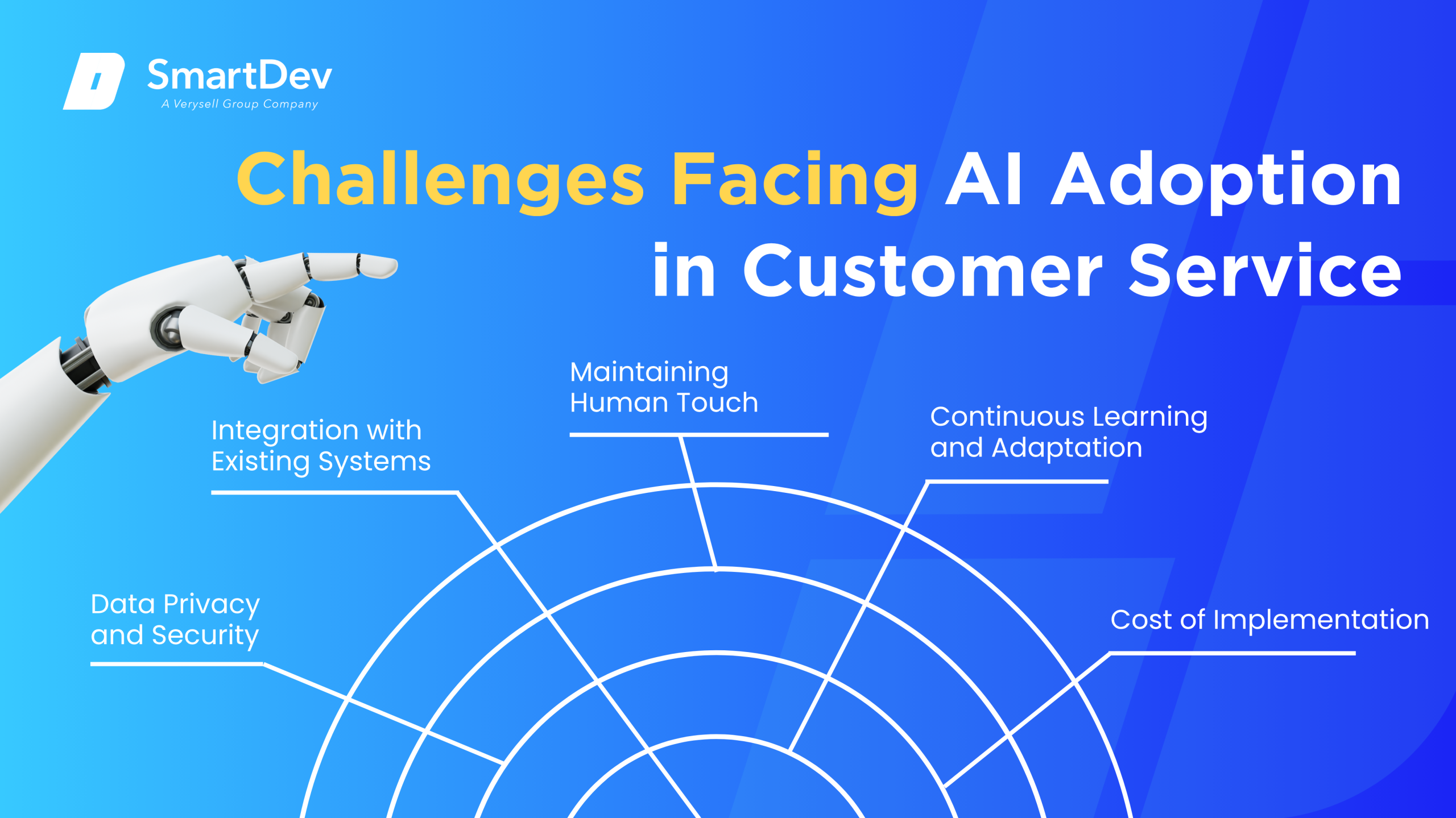
1. Confidentialité et sécurité des données
Protecting customer data is fundamental when implementing AI tools that rely on sensitive information. Strict regulatory standards such as GDPR and CCPA require organizations to maintain high levels of transparency, encryption, and control over data access. Any breach or misuse of information can severely impact customer trust and corporate reputation.
Robust data governance frameworks must be in place to ensure AI systems process information ethically and securely. This includes securing data pipelines, managing consent, and continuously monitoring for vulnerabilities. Building confidence in AI begins with a strong commitment to data privacy and responsible practices.
2. Intégration avec les systèmes existants
Deploying AI tools in established customer service environments often involves complex integration with legacy infrastructure. Compatibility issues, fragmented data sources, and outdated workflows can slow down implementation and reduce system effectiveness. Organizations must be prepared for the technical and organizational lift required to bridge these gaps.
Successful integration requires aligning IT and service teams, cleaning and consolidating data, and often rethinking workflows. It’s not just about plugging in new technology but ensuring that it complements and enhances existing operations. When done right, integration amplifies the impact of AI investments.
3. Maintaining Human Touch
Automation is powerful, but it can’t replace the nuance and empathy of human interaction. Customers dealing with emotionally sensitive or complex situations often prefer speaking with a person. A fully automated experience may feel impersonal, diminishing the brand’s connection with its audience.
Striking the right balance means using AI to enhance, not replace, human engagement. Routine queries can be automated, while high-stakes or emotionally charged interactions are escalated to trained agents. This thoughtful blend of efficiency and empathy leads to a more satisfying and human-centric service experience.
To understand how customer expectations shift between traditional and digital service models, our guide on customer experience in traditional vs. digital-only banks offers key insights.
4. Continuous Learning and Adaptation
AI technologies are not static; they require regular updates and training to stay aligned with evolving customer needs and business priorities. Without ongoing investment in data refinement and model tuning, performance can degrade over time. Stale models may generate irrelevant or even misleading responses.
Maintaining relevance means continuously feeding the system with fresh data, monitoring performance metrics, and adapting algorithms accordingly. Organizations must treat AI as a living system that evolves with their customer base and market dynamics. This requires not just technical upkeep, but a strategic commitment to AI maturity.
5. Cost of Implementation
The upfront investment in AI adoption, including software, integration, infrastructure upgrades, and workforce training, can be substantial. While long-term savings are a key incentive, the initial costs can strain budgets, especially for small and mid-sized companies. These financial barriers often delay or limit adoption.
Moreover, ROI can be difficult to quantify in the early stages, creating uncertainty around funding and prioritization. To justify investment, businesses need clear use cases, defined success metrics, and executive sponsorship. Building a scalable, cost-effective AI roadmap is essential to long-term viability.
Specific Applications of AI in Customer Service

1. AI-Powered Chatbots
AI-powered chatbots are transforming customer interactions by providing instant, 24/7 support. These intelligent systems handle routine inquiries, freeing human agents to focus on complex issues. By leveraging natural language processing (NLP) and machine learning, chatbots understand and respond to customer queries in real-time.
These chatbots analyze customer data to provide personalized responses, enhancing user experience. They can be integrated across various platforms, including websites, social media, and messaging apps, ensuring consistent support. Moreover, chatbots continuously learn from interactions, improving their accuracy and efficiency over time.
Implementing AI chatbots reduces operational costs and response times while increasing customer satisfaction. However, businesses must ensure that chatbots are well-trained to handle diverse customer needs and escalate issues to118 human agents when necessary. Privacy and data security are also critical considerations in chatbot deployment.
Exemple concret :
Motel Rocks, a fashion brand, implemented AI chatbots using Zendesk’s Advanced AI to manage customer inquiries. The chatbots handled routine questions, allowing human agents to focus on complex issues. As a result, the company saw a 43% deflection in tickets and a 9.44% increase in customer satisfaction.
To explore what intelligent virtual assistants can really do for modern support teams, our guide on unlocking conversional AI power explains how it can reshape customer engagement across channels.
2. Voice Assistants and AI Voice Agents
Voice assistants and AI voice agents are enhancing customer service by providing natural, conversational interactions. These systems use speech recognition and NLP to understand and respond to spoken queries, offering a hands-free support experience. They are particularly useful in call centers and for customers who prefer verbal communication.
AI voice agents can handle high call volumes, reducing wait times and improving service availability. They can also assist human agents by transcribing calls and providing real-time suggestions. However, ensuring the accuracy of voice recognition and maintaining a human-like tone are essential for effective implementation.
The integration of AI voice agents leads to increased efficiency and customer satisfaction. Businesses must address potential challenges, such as handling complex or emotional queries, and ensure compliance with data protection regulations.
Exemple concret :
eHealth, a health insurance marketplace, adopted AI voice agents to manage customer service calls. These agents handled routine inquiries, allowing human representatives to focus on complex cases. The implementation led to improved call handling efficiency and customer satisfaction.
3. Predictive Customer Analytics
Predictive analytics uses AI to analyze customer data and forecast future behaviors. By identifying patterns and trends, businesses can anticipate customer needs, personalize experiences, and proactively address issues. This approach enhances customer retention and drives sales growth.
AI models process data from various sources, including purchase history, browsing behavior, and feedback, to generate insights. These insights inform marketing strategies, product recommendations, and customer engagement initiatives. Implementing predictive analytics requires robust data infrastructure and skilled personnel to interpret results.
While predictive analytics offers significant benefits, businesses must ensure data quality and address privacy concerns. Transparent data practices and compliance with regulations like GDPR are essential for maintaining customer trust.
Exemple concret :
Ulta Beauty utilized AI-driven predictive analytics to personalize customer experiences. By analyzing customer data, the company tailored marketing campaigns and product recommendations, leading to increased customer engagement and sales.
4. Sentiment Analysis
Sentiment analysis employs AI to interpret customer emotions from text data, such as reviews, social media posts, and support tickets. By understanding customer sentiments, businesses can gauge satisfaction levels and identify areas for improvement. This real-time feedback enables proactive issue resolution and enhances customer relationships.
AI algorithms analyze language nuances, tone, and context to determine sentiment polarity. Integrating sentiment analysis into customer service platforms allows agents to prioritize responses and tailor interactions accordingly. However, accurately interpreting sarcasm or cultural differences remains a challenge.
Implementing sentiment analysis helps businesses monitor brand perception and improve service quality. Ensuring the accuracy of AI models and combining them with human oversight can mitigate potential misinterpretations.
Exemple concret :
Motel Rocks integrated sentiment analysis into their customer service operations. The118 AI system assessed customer emotions in real-time, enabling agents to address issues promptly and empathetically. This approach contributed to a notable increase in customer satisfaction.
5. AI-Powered Self-Service Portals
AI-powered self-service portals empower customers to find solutions independently, reducing the need for direct support. These platforms use AI to provide personalized recommendations, answer FAQs, and guide users through troubleshooting processes. Enhancing self-service options improves customer satisfaction and reduces support costs.
AI algorithms analyze user behavior to optimize content delivery and suggest relevant resources. Integrating chatbots and virtual assistants into self-service portals further enhances their effectiveness. However, ensuring the accuracy and relevance of information is crucial for user trust.
Implementing AI-driven self-service solutions requires continuous content updates and monitoring. Balancing automation with the option for human assistance ensures comprehensive support for all customer needs.
Exemple concret :
ClickUp, a project management platform, implemented an AI-powered self-service portal to assist users with common queries. The portal provided instant access to relevant resources, reducing support ticket volumes and enhancing user experience.
6. Agent Assist Tools
Agent assist tools leverage AI to support customer service representatives during interactions. These tools provide real-time suggestions, access to knowledge bases, and automated responses, enhancing agent efficiency and accuracy. By reducing cognitive load, agents can focus on delivering personalized service.
AI-powered agent assist systems analyze ongoing conversations to suggest relevant information and responses. They can also automate routine tasks, such as data entry and ticket categorization. Implementing these tools requires integration with existing CRM systems and training for effective use.
While agent assist tools improve productivity, businesses must ensure that AI suggestions are accurate and contextually appropriate. Combining AI assistance with human judgment ensures optimal customer service outcomes.
Exemple concret :
Telstra, an Australian telecommunications company, deployed AI-powered agent assist tools to enhance customer service. The tools provided real-time information and suggestions, enabling agents to resolve issues more efficiently. This implementation led to a 20% reduction in follow-up calls and increased agent effectiveness.
Examples of AI in Customer Service
Études de cas réels
AI is rapidly transforming customer service across industries, enabling smarter, more scalable support strategies. The following case studies highlight how forward-thinking companies are applying AI to redefine customer interactions and service delivery.

1. Motel Rocks: Enhancing Customer Satisfaction with AI Chatbots
Motel Rocks introduced AI-powered chatbots using Zendesk’s Advanced AI to manage routine customer service inquiries. This enabled human agents to focus on more complex and personalized customer interactions. The chatbots provided consistent 24/7 responses, enhancing operational efficiency and service availability.
The implementation resulted in a 43% reduction in ticket volume, easing pressure on support teams. Additionally, customer satisfaction improved by 9.44%, reflecting the value of rapid, intelligent support. This case demonstrates how AI chatbots can deliver both cost savings and higher user satisfaction.
2. Camping World: Improving Call Center Efficiency with AI Voice Agents
Camping World deployed AI voice agents to handle call center traffic during high-demand periods and outside business hours. The AI system processed common queries using speech recognition and natural language understanding. This automation reduced response times and improved the availability of live agents for complex issues.
The outcome was a 33-second drop-in average wait times and a 33% rise in agent efficiency. These improvements led to faster resolutions and better customer experiences. This case highlights how voice AI can optimize call center operations and reduce customer frustration.
3. Telstra: Empowering Agents with AI-Powered Tools
Telstra implemented AI-powered agent assist tools to support service reps with live suggestions and access to internal data. These tools provided agents with real-time prompts, knowledge base links, and recommended replies during conversations. The goal was to reduce resolution time and boost agent confidence.
After deploying the tools, Telstra reported a 20% drop in follow-up calls and faster issue resolution rates. Customers benefited from more accurate and timely responses, while agents experienced reduced cognitive load. This case proves that augmenting human service teams with AI enhances both efficiency and customer satisfaction.
Solutions d'IA innovantes
AI in customer service is evolving rapidly with generative AI leading the transformation. Tools like OpenAI’s118 GPT power conversational agents capable of producing human-like, personalized responses. These systems handle complex inquiries with context-aware dialogue, improving both accuracy and engagement.
Multimodal AI is enhancing service experiences by combining text, voice, and image inputs. Customers can now describe issues verbally or share screenshots, receiving real-time visual guides or spoken instructions. This innovation supports a more intuitive and inclusive approach to problem-solving.
Emotion recognition technologies are adding empathy to AI interactions. By analyzing tone, language, and sentiment, these systems tailor responses to match the customer’s emotional state. This fosters deeper trust, reduces frustration, and drives higher satisfaction in support experiences.
AI-Driven Innovations Transforming Customer Service
Emerging Technologies in AI for Customer Service
Artificial intelligence is revolutionizing customer service by introducing advanced technologies that enhance efficiency and customer satisfaction. Generative AI, for instance, enables the creation of personalized responses, content, and solutions, allowing businesses to cater to individual customer needs effectively. This technology facilitates real-time assistance through chatbots and virtual assistants, providing immediate support and reducing wait times.
Computer vision is another AI technology making significant strides in customer service. By analyzing visual data, businesses can monitor customer interactions, assess product placements, and ensure quality control. This visual analysis aids in understanding customer behavior and preferences, leading to more informed decision-making and improved service delivery.
Le rôle de l'IA dans les efforts de développement durable
AI contributes to sustainability in customer service by optimizing resource utilization and reducing waste. Predictive analytics, powered by AI, allows businesses to forecast customer demand accurately, ensuring that resources are allocated efficiently and minimizing overproduction. This foresight not only conserves resources but also reduces environmental impact.
Moreover, AI-driven systems can monitor energy consumption in real-time, identifying areas where energy usage can be reduced without compromising service quality. By implementing smart systems that adjust energy usage based on demand, businesses can achieve significant energy savings, contributing to environmental sustainability.
How to Implement AI in Customer Service
Integrating AI into customer service is a complex process that requires careful planning, the right infrastructure, and cross-functional coordination. The following step-by-step guide outlines essential actions to navigate this transformation successfully.
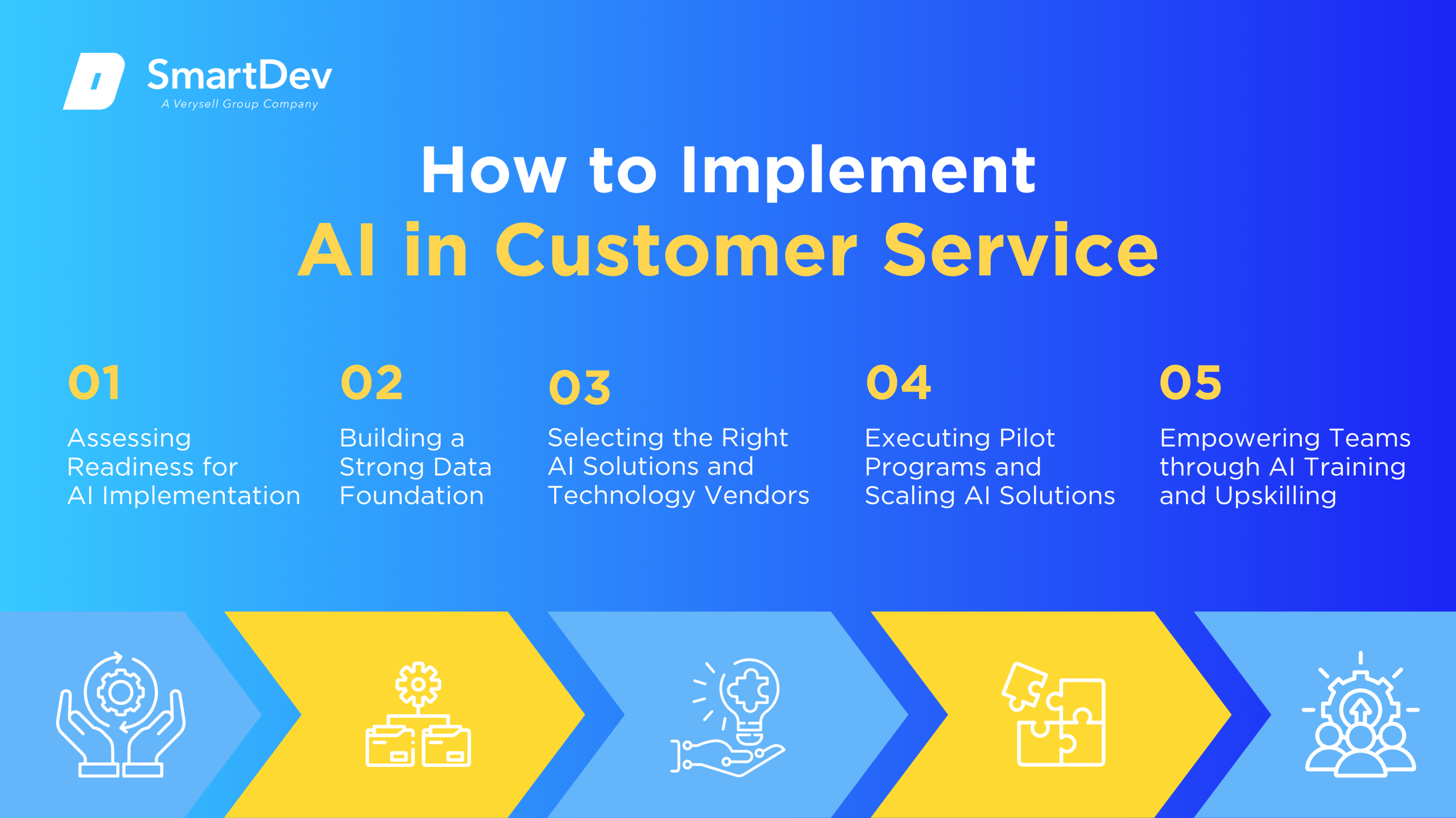
Étape 1. Évaluation de l'état de préparation à l'adoption de l'IA
Before integrating AI into customer service, it’s crucial to evaluate the organization’s readiness. This involves identifying areas where AI can add value, such as handling repetitive inquiries or providing 24/7 support. Assessing current processes and determining how AI can enhance or automate these functions is a vital step.
Additionally, understanding the organization’s data infrastructure is essential. AI systems rely on data to function effectively, so ensuring that data is accessible, accurate, and well-organized will facilitate a smoother AI integration process.
Étape 2. Construire une base de données solide
A robust data foundation is the cornerstone of successful AI implementation. This involves collecting relevant customer data, such as interaction history, preferences, and feedback. Ensuring data quality through regular cleaning and validation processes is equally important to maintain the accuracy and reliability of AI outputs.
Implementing data management best practices, including secure storage and compliance with data protection regulations, will not only support AI initiatives but also build customer trust in the organization’s data handling capabilities.
Étape 3. Choisir les bons outils et fournisseurs
Selecting appropriate AI tools and vendors is critical to the success of AI in customer service. Businesses should evaluate AI solutions based on their ability to integrate with existing systems, scalability, and the specific needs of the customer service function. It’s important to choose vendors with a proven track record and robust support services.
Engaging with vendors who offer customizable solutions can also be beneficial, allowing businesses to tailor AI functionalities to their unique requirements and customer expectations.
Étape 4. Test pilote et mise à l'échelle
Implementing AI should begin with pilot testing in controlled environments to assess performance and identify potential issues. These pilots provide valuable insights into how AI interacts with existing systems and processes, enabling adjustments before full-scale deployment.
Once the pilot phase demonstrates success, businesses can gradually scale up AI integration, continuously monitoring performance and making necessary refinements to ensure optimal outcomes.
Étape 5. Former les équipes pour une mise en œuvre réussie
Employee training is essential for the successful adoption of AI in customer service. Staff should be educated on how AI tools function and how they can complement human efforts. Training programs should focus on developing skills to work alongside AI, such as interpreting AI-generated insights and managing escalated customer interactions.
Fostering a culture of continuous learning and adaptation will empower employees to leverage AI effectively, enhancing overall service quality and customer satisfaction.
Measuring the ROI of AI in Customer Service
Indicateurs clés pour suivre le succès
Evaluating the return on investment (ROI) of AI in customer service involves tracking specific metrics. Productivity improvements, such as reduced response times and increased resolution rates, indicate the efficiency of AI systems. Cost savings achieved through automation, including lower staffing expenses and operational costs, reflect financial benefits.
Customer satisfaction scores and feedback provide insights into the effectiveness of AI in enhancing the customer experience. Monitoring these metrics over time helps in assessing the long-term value of AI investments.
To learn how to quantify the value of your AI initiatives, our guide on AI ROI breaks down the key metrics and strategies for maximizing your investment.
Études de cas démontrant le retour sur investissement
Several companies have successfully implemented AI in customer service, realizing significant ROI. For instance, a leading e-commerce platform integrated AI chatbots to handle customer inquiries, resulting in a 30% reduction in response time and a 25% increase in customer satisfaction.
Another example is a telecommunications company that employed AI for predictive analytics, enabling proactive issue resolution. This approach led to a 20% decrease in customer complaints and substantial cost savings in support operations.
Pièges courants et comment les éviter
Implementing AI in customer service can be a transformative move, but it’s not without its challenges. One of the most common pitfalls is deploying AI solutions without a clear strategy or understanding of customer expectations. This often results in disjointed customer experiences, where automation feels impersonal or insufficiently responsive, leading to frustration rather than satisfaction.
Another critical issue lies in poor data quality and governance. AI systems are only as effective as the data they are trained on; if that data is inaccurate, outdated, or biased, the AI’s decisions and outputs can be flawed. Companies must prioritize building a strong data infrastructure, investing in rigorous data hygiene practices, and regularly auditing datasets to maintain integrity and relevance.
Lastly, businesses often overlook the human element when rolling out AI, treating it purely as a technical upgrade rather than a cultural shift. Resistance from employees, lack of training, and unclear roles can stall adoption and reduce ROI. Avoiding this requires transparent communication, inclusive change management strategies, and continuous learning opportunities to ensure that human and AI collaboration becomes a seamless part of customer service operations.
Future Trends of AI in Customer Service
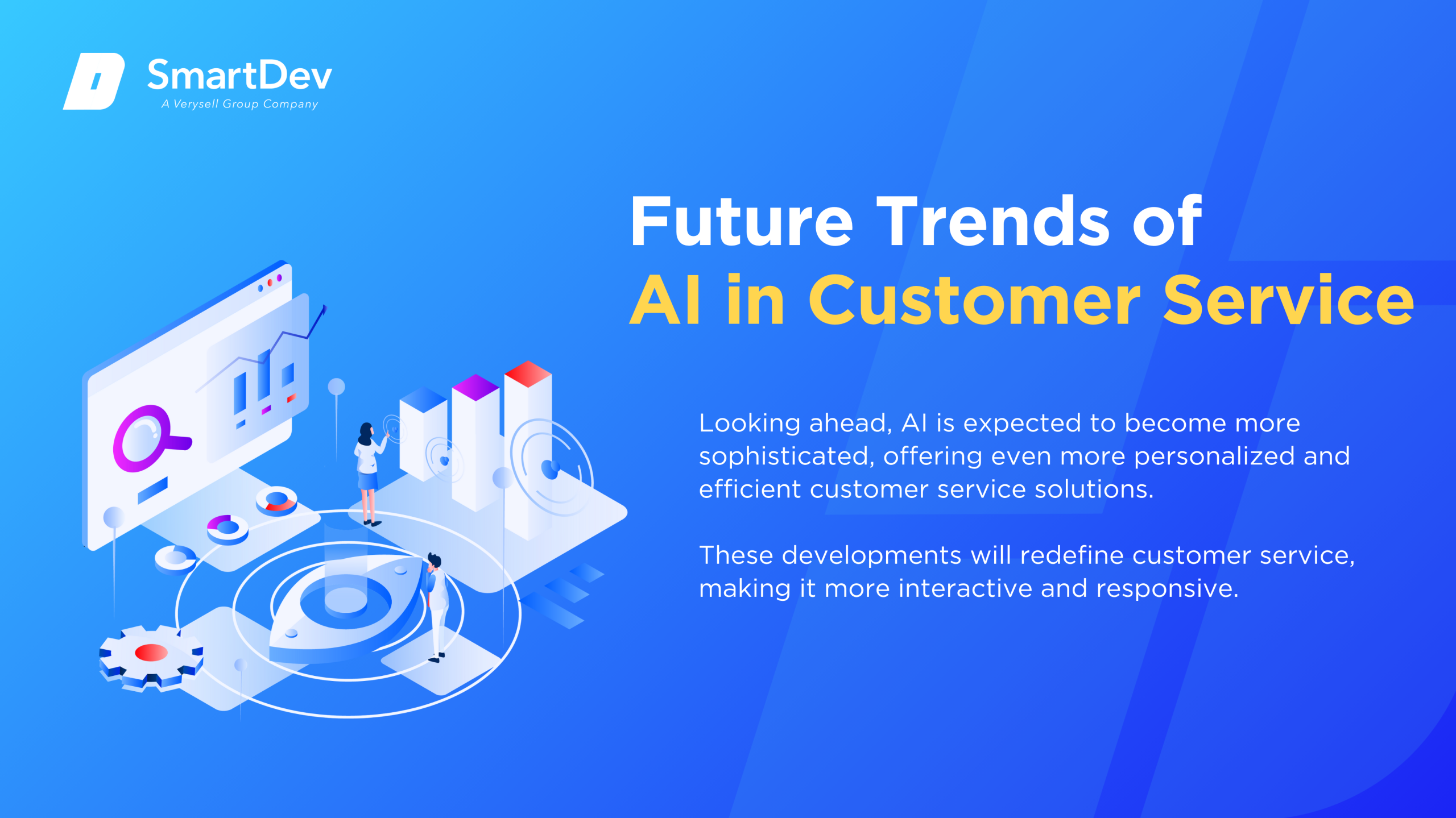
Prévisions pour la prochaine décennie
Looking ahead, AI is expected to become more sophisticated, offering even more personalized and efficient customer service solutions. Advances in natural language processing will enable AI to understand and respond to complex customer queries with greater accuracy.
Integration of AI with other emerging technologies, such as augmented reality and the Internet of Things, will create immersive customer experiences. These developments will redefine customer service, making it more interactive and responsive.
Comment les entreprises peuvent garder une longueur d'avance
To stay ahead in an increasingly AI-driven marketplace, businesses must prioritize investment in research and development. By keeping pace with the latest AI advancements, organizations position themselves to adopt cutting-edge technologies that redefine customer service capabilities. This proactive approach ensures that companies remain competitive and adaptable in a rapidly evolving digital landscape.
Fostering a culture of innovation is equally essential. Encouraging experimentation and fresh thinking enables smoother integration of AI into service strategies and keeps teams agile and adaptable.
Strategic partnerships also play a vital role in staying ahead. Collaborating with AI experts and technology providers can offer the expertise needed to implement sophisticated AI solutions effectively. By aligning these efforts with customer-centric goals, businesses can ensure that AI enhances—not replaces—the human element of customer service, delivering truly impactful experiences.
Conclusion
Principaux points à retenir
AI is rapidly reshaping customer service by delivering faster, more personalized, and cost-efficient experiences. From AI-powered chatbots and generative tools to predictive analytics and computer vision, these technologies are streamlining operations and raising customer satisfaction. As businesses embrace these innovations, the focus must remain on aligning AI tools with real customer needs and expectations.
Successful AI adoption hinges on building a strong data foundation, selecting the right technologies, and training teams to work alongside AI. Measuring ROI through productivity gains, cost savings, and customer feedback ensures long-term value. When implemented thoughtfully, AI can transform customer service from a support function into a strategic driver of growth and customer loyalty.
Aller de l'avant : un chemin vers le progrès
As AI continues to transform customer service, businesses have an unprecedented opportunity to enhance responsiveness, reduce operational costs, and create more personalized customer experiences. By strategically integrating AI technologies—from intelligent chatbots to predictive analytics—organizations can automate routine interactions, resolve issues faster, and empower service teams to focus on delivering exceptional value.
À Développement intelligent, we specialize in building custom AI solutions that elevate customer service while maintaining brand voice and human empathy. Whether you’re exploring AI-driven support tools, automating service workflows, or leveraging machine learning to anticipate customer needs, our team works closely with you to ensure a seamless and impactful implementation.
Contactez-nous aujourd'hui to discover how AI can help you exceed customer expectations, improve service efficiency, and future-proof your support operations.
—
Références:
- The state of AI: How organizations are rewiring to capture value | McKinsey & Company
- 61 AI Customer Service Statistics in 2025 | Desk365
- Customer Service: How AI Is Transforming Interactions | Forbes
- 6 ways AI can influence the future of customer service | IBM
- Customer Service AI: Hone in on High-ROI Use Cases | Gartner
- AI Voice Agents Are Ready to Take Your Call | The Wall Street Journal
- AI in Customer Experience: 5 Companies’ Tangible Results | CMSWire
- AI in customer service | IBM
- Customer Service ROI: How to Improve with AI in 2025 | Sprinklr
- Maximizing AI ROI in Customer Support: Potential vs Reality | Virtasant
- How Industries Are Using AI-Driven Analytics To Enhance Sustainability | Forbes
- AI-driven predictive models for sustainability | Journal of Environmental Management







